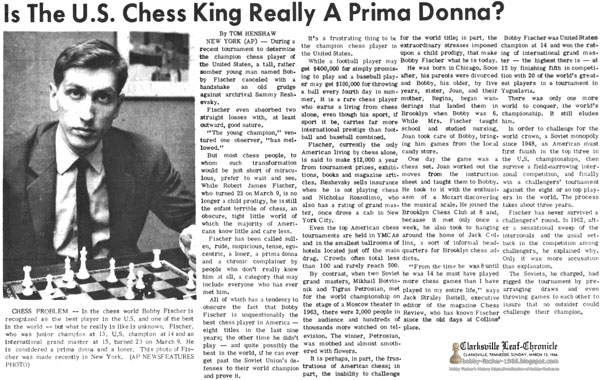The Leaf-Chronicle, Clarksville, Tennessee, Sunday, March 13, 1966 - Page 3 (2) (3)
CHESS PROBLEM— In the chess world Bobby Fischer is recognized as the best player in the U.S. and one of the best in the world — but what he really is like is unknown. Fischer, who was junior champion at 13, U.S. champion at 14 and an international grand master at 15, turned 23 on March 9. He is considered a prima donna and a loner. This photo of Fischer was made recently in New York. (AP NEWSFEATURES PHOTO)
Is The U.S. Chess King Really A Prima Donna?
By Tom Henshaw
NEW YORK (AP)—During a recent tournament to determine the champion chess player of the United States, a tall, rather somber young man named Bobby Fischer canceled with a handshake an old grudge against archrival Sammy Reshevsky.
Fischer even absorbed two straight losses with, at least outward, good nature.
“The young champion,” ventured one observer, “has mellowed.”
But most chess people, to whom such transformation would be just short of miraculous, prefer to wait and see. While Robert James Fischer, who turned 23 on March 9, is no longer a child prodigy, he is still the enfant terrible of chess, an obscure, tight little world of which the majority of Americans know little and care less.
Fischer has been called sullen, rude, suspicious, tense, egocentric, a loner, a prima donna and a chronic complainer by people who don't really know him at all, a category that may include everyone who has ever met him.
All of which has a tendency to obscure the fact that Bobby Fischer is unquestionably the best chess player in America — eight titles in the last nine years; the other time he didn't play — and quite possibly the best in the world, if he can ever get past the Soviet Union's defenses to their world champion and prove it.
It's a frustrating thing to be the champion chess player in the United States.
While a football player may get $400,000 for simply promising to play and a baseball player may get $100,000 for throwing a ball every fourth day in summer, it is a rare chess player who earns a living from chess alone, even though his sport, if sport it be, carries far more international prestige than football and baseball combined.
Fischer, currently the only American living by chess along, is said to make $12,000 a year from tournament prizes, exhibitions, books and magazine articles. Reshevsky sells insurance when he is not playing chess and Nicholas Rossolimo, who also has a rating of grand master, once drove a cab in New York City.
Even the top American chess tournaments are held in YMCA's and in the smallest ballrooms of hotels located just off the main drag. Crowds often total less than 100 and rarely reach 500.
By contrast, when two Soviet grand masters, Mikhail Botvinnik and Tigran Petrosian, met for the world championship on the stage of a Moscow theater in 1963, there were 2,000 people in the audience and hundreds of thousands more watched on television. The winner, Petrosian was mobbed and almost smothered with flowers.
It is perhaps, in part, the frustrations of American chess; in part, the inability to challenge for the world title; in part, the extraordinary stresses imposed upon a child prodigy, that make Bobby Fischer what he is today.
He was born in Chicago. Soon after his parents were divorced and Bobby, his older, by five years, sister, Joan, and their mother, Regina, began wanderings that landed them in Brooklyn when Bobby was 6. While Mrs. Fischer taught school and studied nursing, Joan took care of Bobby, bringing him games from the local candy store.
One day the game a chess set. Joan worked out the moves from the instruction sheet and taught them to Bobby. He took to it with the enthusiasm of a Mozart discovering the musical scale. He joined the Brooklyn Chess Club at 8 and, because it met only once a week, he also took to hanging around the home of Jack Collins, a sort of informal headquarters for Brooklyn chess addicts.
“From the time he was 8 until he was 14 he must have played more chess games than I have played my entire life,” says Jack Straley Battell, executive editor of the magazine Chess Review, who has known Fischer since the old days at Collins' place.
Bobby Fischer was United States champion at 14 and won the rating of international grand master — the highest there is — at 15 by finishing fifth in competition with 20 of the world's greatest players in a tournament in Yugoslavia.
There was only one more world to conquer, the world's championship. It still eludes him.
In order to challenge for the world crown, a Soviet monopoly since 1948, an American must first finish in the top three in the U.S. championships, then survive a field-narrowing interzonal competition, and finally win a challengers' tournament against the eight or so top players in the world. The process takes about three years.
Fischer has never survived a challengers' round. In 1962, after a sensational sweep of the interzonals and the usual setback in the competition among challengers, he explained why. Only it was more accusation than explanation.
The Soviets, he charged, had rigged the tournament by pre-arranging draws and even throwing games to each other to insure that no outsider could challenge their champion.























